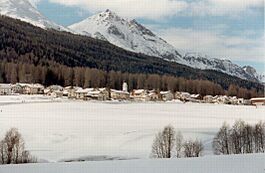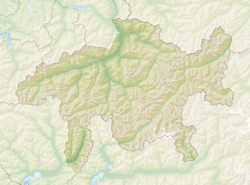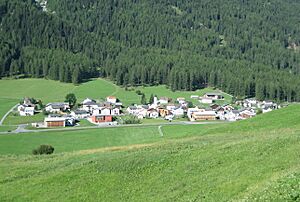Fuldera facts for kids
Quick facts for kids
Fuldera
|
||
|---|---|---|
 |
||
|
||
| Country | Switzerland | |
| Canton | Graubünden | |
| District | Inn | |
| Area | ||
| • Total | 13.19 km2 (5.09 sq mi) | |
| Elevation | 1,638 m (5,374 ft) | |
| Population | ||
| • Total | 121 | |
| • Density | 9.17/km2 (23.76/sq mi) | |
| Postal code |
7533
|
|
| Surrounded by | Lü, Müstair, Tschierv, Valchava | |
Fuldera is a small village located in the beautiful Val Müstair area of Switzerland. It's part of the Graubünden canton, which is like a state in Switzerland. In 2009, Fuldera joined with several other villages, including Lü and Müstair, to create the larger municipality of Val Müstair. This means they all work together as one bigger community now.
Contents
History of Fuldera
Fuldera has a long history! The village was first written about in official records way back in 1322. At that time, its name was Faldiera.
Geography and Nature
Fuldera covers an area of about 13.2 square kilometers (which is about 5.1 square miles). A big part of this land, almost 25%, is used for farming. This includes fields where crops are grown or animals graze.
About 37% of the area is covered by forests. These are important for wildlife and the environment. Only a small part, about 1.4%, has buildings or roads. The rest of the land, about 36%, is made up of things like rivers, glaciers, or mountains. These parts are not used for farming or building.
The village is located in the Val Müstair area, right next to the Rombach river. Fuldera is actually made up of two smaller parts: the bigger Fuldera-Dora and the smaller Fuldera-Daint.
People and Population
In 2008, Fuldera had a population of 121 people. A small number of these residents, about 6.6%, were from other countries. Over the ten years before 2008, the number of people living in Fuldera went down slightly.
Age Groups in Fuldera
In 2000, the population was almost evenly split between males (47.9%) and females (52.1%). Here's a look at the different age groups:
- About 17% of the people were children aged 0 to 9 years old.
- Another 10% were teenagers between 10 and 14 years old.
- Adults aged 20 to 29 made up about 8.7% of the population.
- People aged 30 to 39 were the largest adult group, at about 17.4%.
- About 10% were 40 to 49 years old, and 8.7% were 50 to 59 years old.
- Older adults, aged 60 to 69, made up about 14% of the population.
- About 5% were 70 to 79 years old, and 7% were 80 to 89 years old.
Education and Jobs
Most adults in Fuldera (between 25 and 64 years old) have finished their education beyond basic schooling. This includes people who went to a university or a special college called a Fachhochschule.
The unemployment rate in Fuldera is quite low, around 1.63%. This means most people who want to work have jobs.
- In 2005, about 13 people worked in the primary economic sector. This means jobs related to getting raw materials, like farming or forestry. There were 6 businesses in this area.
- About 18 people worked in the secondary sector. These are jobs that make things, like factories or construction. There were 2 businesses in this area.
- About 17 people worked in the tertiary sector. These are jobs that provide services, like shops, hotels, or healthcare. There were 6 businesses in this area.
Historical Population
Here's how the population of Fuldera has changed over many years:
| year | population |
|---|---|
| 1835 | 179 |
| 1850 | 123 |
| 1900 | 98 |
| 1950 | 118 |
| 2000 | 115 |
| 2008 | 121 |
Languages Spoken
Most people in Fuldera speak Rhaeto-Romance. This is a special language spoken in parts of Switzerland. In 2000, about 75% of the people spoke Romansh. The Romansh speakers in Fuldera use a specific type of Romansh called the Vallader dialect.
The second most common language is German, spoken by about 23.5% of the people. A very small number, less than 1%, speak Italian.
For a long time, from 1880 to 1980, most people in Fuldera spoke Romansh as their main language. Even in 2000, most people (92%) could understand Romansh, even if they spoke another language at home.
Here's a table showing how the languages have changed over the years:
| Languages | Census 1980 | Census 1990 | Census 2000 | |||
|---|---|---|---|---|---|---|
| Number | Percent | Number | Percent | Number | Percent | |
| German | 5 | 5.00% | 17 | 16.19% | 27 | 23.48% |
| Romanish | 95 | 95.00% | 87 | 82.86% | 86 | 74.78% |
| Italian | 0 | 0.00% | 1 | 0.95% | 1 | 0.87% |
| Population | 100 | 100% | 105 | 100% | 115 | 100% |
See also
 In Spanish: Fuldera para niños
In Spanish: Fuldera para niños
 | Sharif Bey |
 | Hale Woodruff |
 | Richmond Barthé |
 | Purvis Young |





